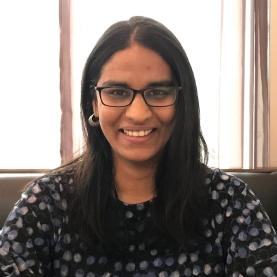Technology has changed the nature of work worldwide – particularly during the pandemic of the past year. Devika Narayan, a Ph.D. candidate in the Department of Sociology, is examining the changing structure of markets, new digital platforms, and the emergent workplace structures that shape contemporary capitalism.
Devika has been awarded both the Interdisciplinary Doctoral Fellowship and the Doctoral Dissertation Fellowship and has presented her research at numerous conferences in Europe, the U.S., and India. Her work has been published by Economic and Political Weekly and Water International, and is currently being reviewed by journals in the fields of economic sociology, sociology of work, and urban studies.
Devika began her journey steeped in an educational environment in Bangalore, and tells us she plans to continue a life of teaching and research after she leaves the University of Minnesota.
Meet Devika Narayan
What led you to the research you are pursuing? Does it relate in any way to your background? Other influences?
My research focuses on how new technologies catalyze or combine with shifts in the domain of work, organizations, and industry. During my first year of graduate school I spent three months conducting pre-dissertation research in Bangalore. I was initially interested in the intersection of finance and urban inequality. However, Bangalore is a key hub of the global software industry and I was quickly drawn to questions pertaining to technological change. I was struck by early conversations I had with people in the corporate sector that suggested new digital technologies were reshaping the structure of firms, the sphere of employment and work, and the nature of managerial practices in India and beyond. This fascinated me. I am not sure if this fascination relates to my personal background other than the important fact that I am from Bangalore. That said, I never was particularly curious about the tech industry prior to graduate school. More relevant to my academic trajectory was a long standing interest in the nuts and bolts of capitalist industries and political economy. Technology simply became an entry point to studying firms - their markets, their labor processes, and their practices in an intensely globalized and unequal world.
What do you value most about your graduate education?
Intellectual and creative freedom on the one hand and a sense of community on the other. I managed to construct a highly supportive cocoon made up of wonderfully generous mentors and peers. From day one, I actively sought out people with whom I felt a political, academic and affective resonance. I found my tribe. I kept them close. This gave me the confidence I needed to trust my own intuition and convictions. The people foundational to my graduate school experience have had faith in my ability to find and follow my own path. They have been extremely engaged, but also gave me ample space for my own exploration. And so I have had a good balance between autonomy and the gift of community. This is a long-winded way of saying I am lucky to have had the best advisers, the best doctoral committee, and the best extended network of fellow students and faculty. This has been of tremendous value.
Please explain a bit about your background
I grew up in a household of school teachers. My parents co-founded a small, non-traditional school in Bangalore and that is where I grew up. This was a school that created a rich learning environment based on community living; encouraging students to be reflective, curious, and skeptical of taken-for-granted ideas and structures of authority. My schooling, which was blended into my home environment, has shaped my journey in ways that I cannot quite measure or clearly define. In high school I discovered sociology, after which there was no doubt about what I wanted to pursue.
What do you hope to do after getting your degree?
I want to teach and do research in the area of technology, industrial change, work and labor, and globalization. As is patently clear, higher education is being hollowed out thanks to defunding and associated processes. Like many, I could never presume that I would indeed be able to do this given the erosion of stable jobs and pathways. In recent years, growing public and scholarly interest in digital technology has meant that the niche labor market for academics studying these themes is beginning to improve. I will soon be a postdoctoral researcher at the University of Oxford and then an Assistant Professor at the University of Notre Dame. I am excited about this next phase in my life.
